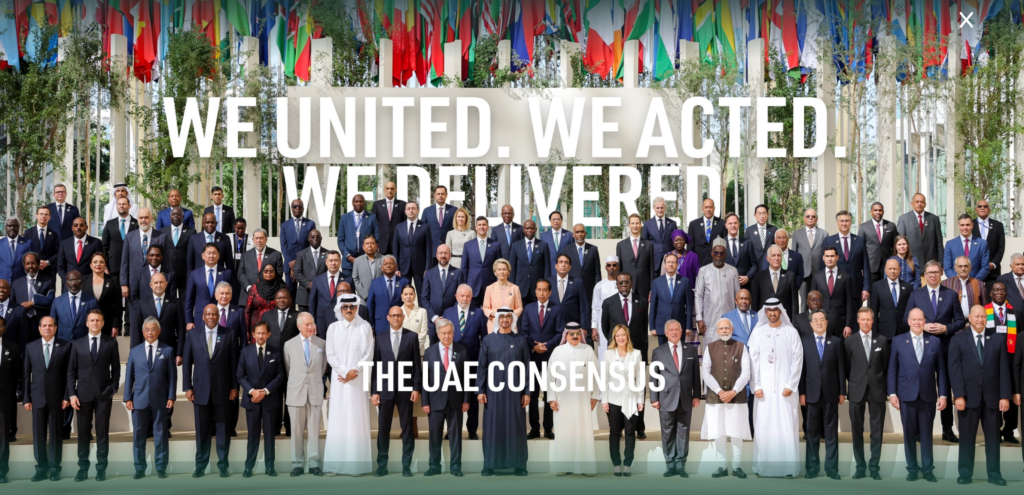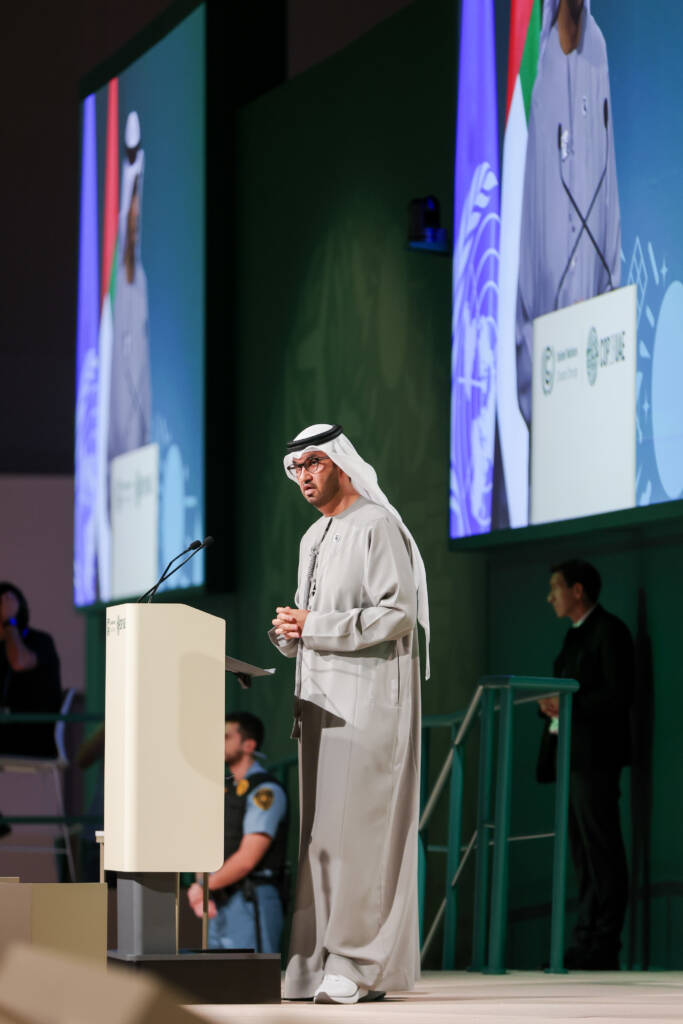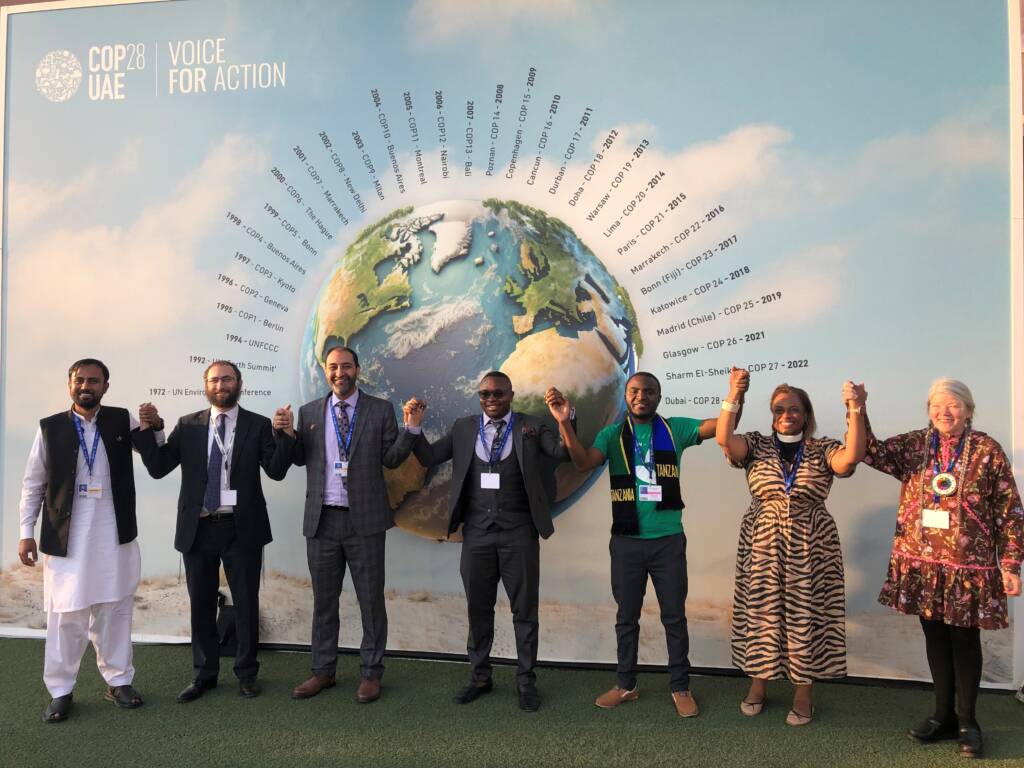The provisional total for the 28th Conference on the Parties (COP28) suggests that 97,372 delegates registered to attend the summit in person. With a further 3,074 attending virtually, this takes the overall total to 100,446. These numbers easily make the Dubai event the largest COP in history. The first climate COP – held in Berlin in 1995 – had 3,969 delegates.
Among those nearly 100,000 delegates were four Presbyterians, including Alethia White, Co-Regional Liaison for Northern and Central Europe, for whom this event was a first. “Some of the most beautiful parts of COP for me was the way in which it is, in a lot of ways, a microcosm of the whole globe really. And we are all here because we are committed to caring about this issue of climate change.”
 A screen shot from the COP28 Presidency website plays on the “Unite. Act. Deliver” motto of this year’s COP after the closing of this year’s gathering. The UAE Consensus leaves many wondering if the COP really delivered on those promises.
A screen shot from the COP28 Presidency website plays on the “Unite. Act. Deliver” motto of this year’s COP after the closing of this year’s gathering. The UAE Consensus leaves many wondering if the COP really delivered on those promises.
Negotiations moved into overtime on December 13th after the Presidency released a a draft one day before the intended closing that was met with disdain by many nations, civil society organizations and faith groups that had demanded stronger language. Parties worked through the night to deliver a sort-of consensus, with one Global South group noting for the record that they hadn’t finished their discussion before the gavel, signaling the end of negotiations, fell.

H.E. Dr. Sultan Al Jaber, COP28 President speaks onstage during the Closing Plenary at the UN Climate Change Conference COP28 at Expo City Dubai on December 13, 2023, in Dubai, United Arab Emirates. (Photo by COP28 / Christopher Edralin)
The COP28 Presidency website touts the final agreement, called the UAE Consensus, reached at the summit as an “enhanced, balanced, historic package” to accelerate climate action. One ABC News article offers another view, that COP28 President Dr. Sultan Al Jaber walked out with what the United Arab Emirates wanted all along — the prestige of hosting negotiations that got the world to agree to transition away from fossil fuels while still being able to pump ever-more oil.
It also urges for “accelerating efforts towards the phase-down of unabated coal power” and for “tripling renewable energy capacity globally and doubling the global average annual rate of energy efficiency improvements by 2030.”
It does not mandate an absolute phase-out though. A “phase-out” commitment requires a shift away from fossil fuels until their use is eliminated, while a “phase-down” agreement merely indicates a reduction in their use — but not a true end.
Sultan Al Jaber delivered remarks at the closing of COP28 declaring that “we can truly say that we united, we acted, and we delivered.” And while he did acknowledge that “An agreement is only as good as its implementation. We are what we do, not what we say. We must take the steps necessary to turn this agreement into tangible action.” many believe that COP28 missed a crucial opportunity and could only be considered a success if it resulted in a deal to phase out all fossil fuels.
Alden Meyer, a senior associate at the independent climate change think tank E3G stated that “The atmosphere responds to one thing: Emissions. And all the declarations, all the decisions, all the platitudes, all the announcements in the world, if it doesn’t translate into real world action that reduces emissions, is not worth the paper it’s written on.”
Anne Rasmussen, representing the alliance of small island states (AOSIS), told the final COP28 plenary that “In terms of safeguarding 1.5C in a meaningful way, the language is certainly a step forward, it speaks to transitioning away from fossil fuels in a way the process has not done before. But we must note the text does not speak specifically to fossil fuel phase-out and mitigation in a way that is in fact the step change that is needed. It is incremental and not transformational. We see a litany of loopholes in this text that are a major concern to us.”
Mattias Söderberg of DanChurchAid and co-chair of ACT’s Climate Justice group agreed with Rasmussen’s take that the agreement is full of loopholes. “It will thus be up to each country, how they will move forward. At the same time there is no promise about additional funding to the global south, which means that the transition may not happen. The next COP will focus on finance, and that is when we will find out if (a) green transition will be possible.”
ACT Alliance followed the negotiations for more than two weeks, keeping track of all climate finance issues, in particular Adaptation and Loss and Damage funding, with an eye on the Global Stocktake. How human rights and gender were treated in the negotiations were also key concerns. In their press release they shared that overall, COP28 started on a high note for those concerned about climate justice. Parties agreed to operationalize the Loss and Damage Fund with pledges of up to $792 million. Sadly, this is less than 1 percent of what is needed to support people facing the greatest challenges from the impacts of climate change. While pledges came in, much more is needed to support people affected by climate change-related loss and damage. Contributions to the fund should be based on common but differentiated responsibilities and the polluter pays principle, not be made on a voluntary basis.
Maua Maro, Lutheran World Federation delegate to COP28 commented that “Though the result of COP28 is disappointing, youth will never give up pushing for more ambition and a clear path to implement the agreed operationalisation of the Loss and Damage Fund. As youth living in a community where there is no more room for adaptation, mainstreaming non-economic loss and damage, especially on the intangible impacts caused by climate change such as… displacement, loss of land and people, culture and the knowledge of Indigenous peoples, must be addressed without delay.”
“As COP ends in this season of Advent, we are reminded of the unique voice of the faith community. Advent asks people of faith to actively wait, to sit, to observe, and to use our voices to uplift those around the world who are vulnerable –in this case to impacts of the climate crisis,” another PC(USA) COP28 delegate Christina Cosby, domestic policy representative in the Office of Public Witness noted. “This anticipatory waiting is not easy, demanding that we embrace the tension between the present reality and our hopeful aspirations. We feel disappointment as leaders prioritized politics over people and the planet. Simultaneously, a glimmer of hope emerged today as policies shift from wide inclusion to phasing out fossil fuels, a primary contributor to the rising temperature of our planet.”
Despite what feels to many as a disappointing end, speakers at a Religion Media Centre briefing reminded us that the shortcomings of COP28 are not the end of the story.  Faith leaders and faith-based organizations showed up in force at the UN climate conference that concludes this week in Dubai. Communities of faith are crucial in advocating for a sustainable future. Photo from Rabbi Yonotan Neril.
Faith leaders and faith-based organizations showed up in force at the UN climate conference that concludes this week in Dubai. Communities of faith are crucial in advocating for a sustainable future. Photo from Rabbi Yonotan Neril.
Communities of Faith continue to have a key role in moving forward progress on climate change. Rabbi Yonatan Neril, founder and current director of the Interfaith Centre for Sustainable Development, based in Jerusalem shared that “It’s not all about fossil fuels and decarbonisation,” he said. “There’s actually something deeper happening on Planet Earth, which is … that the climate crisis has deeper roots, including materialism, greed, short-term thinking and finding our pleasure and fulfilment in the physical world. It’s not about trying to maximise our narrow national interests. It’s about how do we, as a collective, as humanity on one ship, come together to solve this crisis through an awareness of interdependence, interconnected action, love for God’s creation, humility, simplicity, modesty.”
Modesty and simplicity weren’t necessarily the words to describe the event held at Expo City, the convention center, which is the size of Central Park in New York.
“This conference is big. This crisis is big. This moment in history is big. What is required of us to meet this moment is big,” said a third PC(USA) delegate Jed Koball, Joining Hands Catalyst for Extractive Industries, Human Rights and the Environment. “And yet it is so simple. It’s about showing up. Again and again and again. Like the many, many people across this one planet we share who have been fighting the good fight day after day, year after year, whether at a COP on the other side of the world or in their own back yard. It all matters. Each movement matters. Each person matters. Each face and name matters – names and faces we can only know as long as we keep showing up.”
Representatives from the PC(USA) have been present at every COP since it’s inception in 1995.